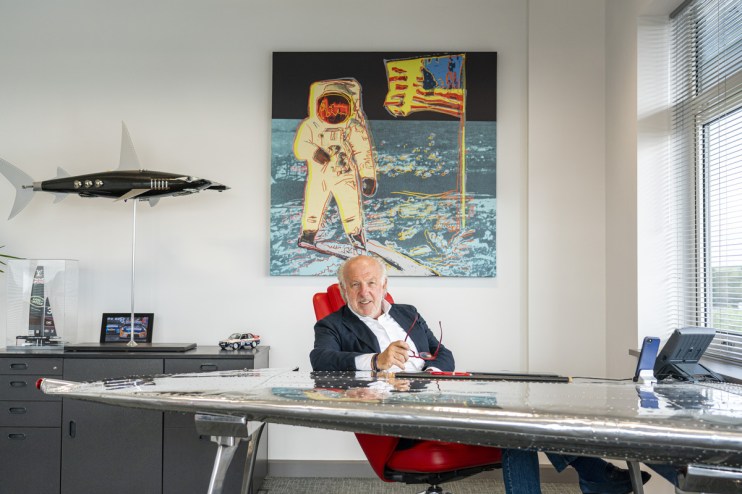Motorsport UK chair: F1 and sport here needs more recognition

City A.M.’s Matt Hardy sat down with Prodrive and Motorsport UK chair David Richards to discuss the quality of “our” Silicon Valley, entering Formula 1 and the future of motorsport on these shores.
When you compare the Bay region of California with its millions of inhabitants overheating in the West Coast sunshine with the often damp setting of Banbury and the surrounding area, few similarities slap you in the face.
The tech labs and data centres of Santa Clara and San Mateo may be more commonly known as Silicon Valley – where the great and good of the microchip, AI and Metaverse worlds collide in a nerdfest of human advancement – but we, too, have a Silicon Valley of our own.
Ours, though, spans areas of the Midlands – with a Woking enclave – and has given the world Formula 1, rally driving, Dakar and motorsports categories as far as the eye can see.
Great Britain is a leader in the technology that’s changing the world one wheel and brake disc at a time. But big business will be the first to say we’re not exactly good at boasting about it.
F1 here is thriving
“The new 10-year contract for the British Grand Prix is great news for motorsport here, and that has a halo effect over everything,” chairman of advanced engineering firm Prodrive and chair of Motorsport UK, David Richards, tells City A.M.
“Most of the Formula 1 teams are based here in England, that doesn’t look like changing at all. So there’s the infrastructure here, there’s the technology, there’s the employment and the other activities – whether it’s sports, car racing, rally – have a lot of the operations based here in the UK.
“And we’re still today renowned anywhere you go in the world. They look at the UK as the centre of the world, the epicentre for anything to do with motorsport and the engineering of motorsport.
“It is just disappointing that the government often overlooks this and doesn’t see the importance of it – bar some R&D tax cuts – and how significant the reputation we enjoy is everywhere in the world.
“We have been a world leader in a development role for many, many years, if not for all the existence of Formula 1. And all it needs is a bit more recognition. It’s applause and recognition that will drive the business forward and help more than anything else.”
Getting in the club
Richards’ experience in the motorsport world speaks for itself: former chair of Aston Martin, ex-team principal of F1 outfits BAR and Benetton, former World Rally Championship winner and inductee into the Motor Sport Hall of Fame.
And he also has experience of attempting to join Formula 1 with a new team, something Andretti recently tried to do, to no avail.
“The process is quite tricky, it’s not straightforward and it’s always surrounded by political agendas as well,” Richards adds.
“The first time we went for it with all the blessing of the FIA, one of the teams decided it wasn’t in their interest to have us there, found a bit of a loophole and delayed everything for us to the point where it was impossible for us to get ready for the following season. So they succeeded in keeping us out.
“And the next time, we got told at the 11th hour that the only teams that will be accepted were those with Cosworth engines. We were trying to break the stranglehold of the manufacturers and make sure there was a customer engine available for all the teams in the event that manufacturers pulled out or went off and did their own thing.
“So there’s always an agenda behind the scenes that you haven’t quite worked out or if you have worked out, there’s not a lot you can do about it.”
Formula 1 headlines
But Formula 1 has changed significantly in recent weeks with a number of stories hitting the headlines before this weekend’s season opener in Bahrain.
Hamilton will ditch Mercedes for Ferrari, team principal roles have been left on shaky ground and the sport is determined to entertain more and more.
“[Motorsport is] in a very interesting transition period at the moment,” Richards says.
“Historically, car manufacturers have been the backbone of motorsport programmes with the old adage of ‘win on Sunday, sell on Monday’ but in the last 20 or 30 years motorsport has moved in a direction being polarised into different sectors and it’s very much become entertainment, focused on TV packaging.
“But one of the things that happened with the cost cap on Formula 1 teams, and my own businesses as well, is that we’ve all taken the opportunity to drive alternative programmes, whether it’s in aerospace, alternative materials with composites, Mercedes supporting Ben Ainslee in the America’s Cup.
“We’ve all got these peripheral teams now on the outside developing a whole range of technologies that are really leveraging motorsport.”
Banbury, Milton Keynes, Woking, Brackley and other quaint spots across England may not have the razzmatazz of California, but they’re quietly going about their business in leading the international market in motorsport and engineering.
And if we shout too loudly maybe the tech giants in the Golden State might want a slice of the action. So perhaps we should be quietly proud of our successes, in the good old fashioned British way, and revel in it. How’s that for an idea?